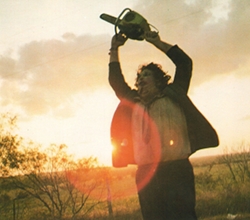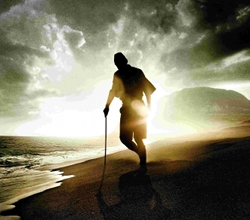Review: Elevator to the Gallows (1958)
France in the 1960s is almost always associated with the New Wave. François Truffaut, along with Jean-Luc Godard, introduced the film movement in 1959, and the two ruled French cinema until the death of the New Wave in 1967. Yet even before Truffaut made a splash with The 400 Blows (1959), another rebellious director named Louis Malle created his own ripples in French cinema. His directorial debut, Elevator to the Gallows (1958) introduced a lesser-known film movement (the Left Bank) to audiences, and French cinema, as well as other national cinemas, would never be the same again.
Elevator to the Gallows constructs an intricate plot, one that splits into two stories. The first story revolves around Julien Tavernier (Maurice Ronet), a former soldier, and Florence Carala (Jeanne Moreau), his boss’ wife. Julien and Florence share a passionate love affair, one that births a diabolical plot to kill Florence’s husband, Simon (Jean Wall). Julien follows through with the plan, killing Simon in his office building and making the murder appear as a suicide. As Julien flees the scene, he remembers he left a piece of incriminating evidence in the office. He returns to the building and boards the elevator, rising closer to Simon’s office. Suddenly, the security guard closes the building for the night, shutting off the power and unintentionally trapping Julien in the elevator. Florence, knowing nothing of these events, waits for Julien in a bar. His absence leaves her worried. She desperately searches the bars and streets for Julien, but she soon fears the worst and traps herself in her own private sorrow.
The second story centers on Véronique (Yori Bertin), a flower shop girl, and Louis (Georges Poujouly), her boyfriend. On the same day as Simon’s murder, the two steal Julien’s car (along with Julien’s coat and gun). Using Julien’s name, the two check into a hotel where they befriend a German couple. Later in the night, Louis attempts to steal the German couple’s car, but the German couple immediately catches him. Desperate to escape, Louis shoots the two with Julien’s gun, and he and Véronique flee. When the bodies of the German couple are discovered, the only suspect that the police are interested in finding is Julien, who still sits imprisoned in the elevator.
The intricate plot of Elevator is tightly woven around a brilliant aspect of Malle’s style: his ability to construct cinematic spaces as emotional and psychological atmospheres. Malle’s ability to construct these landscapes aids in developing, as well as evolving, his characters. He traps Julien in a claustrophobic elevator as Julien desperately tries to avoid being caught by the police, and he places the desperate Florence into empty streets and crowded bars. Malle would later explore these emotional landscapes in such films as The Lovers (1958), Zazie dans le métro (1960), and even Au revoir les enfants (1987), but in Elevator, Malle perfects these environments, using them as a means of stripping the characters bare and forcing them to confront their emotions and fears.
The stripped characters are further made vulnerable by Miles Davis’ amazing score. His lonely trumpet takes Moreau’s hand as she walks down the Champs Elysées, while his clanking cymbals intensify Julien’s desperation. His score becomes an aural space, one that not only compliments Malle’s emotional and psychological atmosphere, but also highlights a cinematic treasure: Jeanne Moreau. Both Malle and Davis use her vulnerable performance in order to elevate her from a one-dimensional vixen into a three-dimensional woman, one who lives and breathes hopelessness and desperation. The combination of Malle’s direction, Davis’ score, and Moreau’s performance seamlessly construct one of the best trios in cinematic history.
Malle not only constructs a wonderful film, but he creates a dynamic work of art. Without playing into the style of the New Wave, Malle utilizes a coherent narrative, relatable characters, beautiful music, and psychological landscapes to construct a magical film, one that deserves its place as a landmark work in cinematic history. His debut may not have had as large of a wave as that of Truffaut or Godard, yet it made a splash nonetheless and that splash left an impact on modern-day filmmakers as well as cinephiles.













 Review: Dogtooth (2009)
Review: Dogtooth (2009) Review: Shame (2011)
Review: Shame (2011) Review: Hugo (2011)
Review: Hugo (2011) Review: Kontroll (2003)
Review: Kontroll (2003) Review: Dillinger (1945)
Review: Dillinger (1945)





